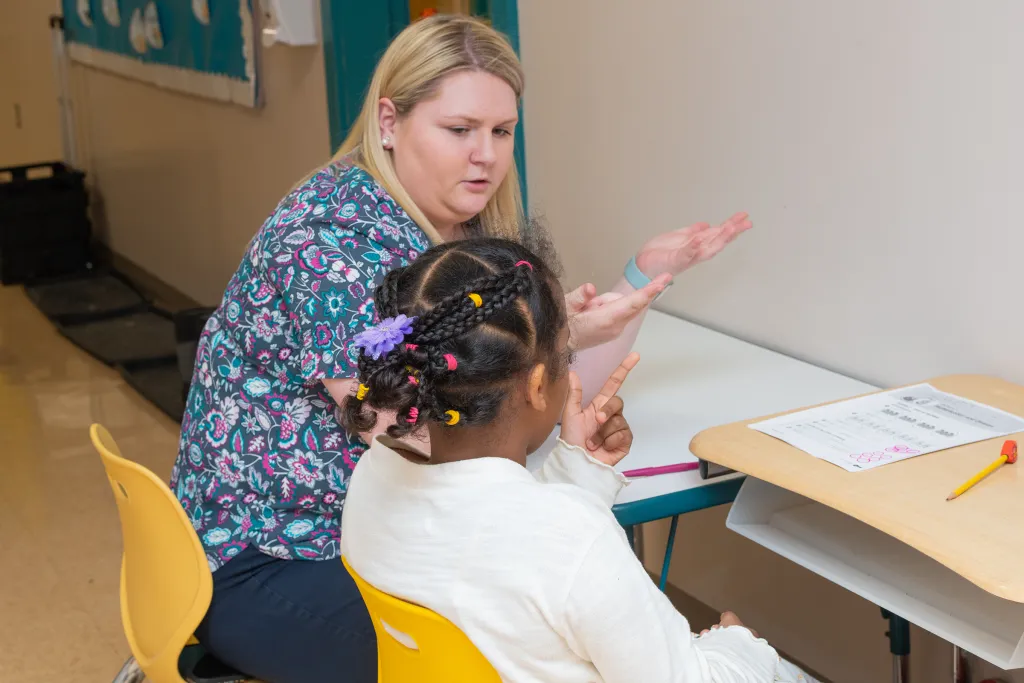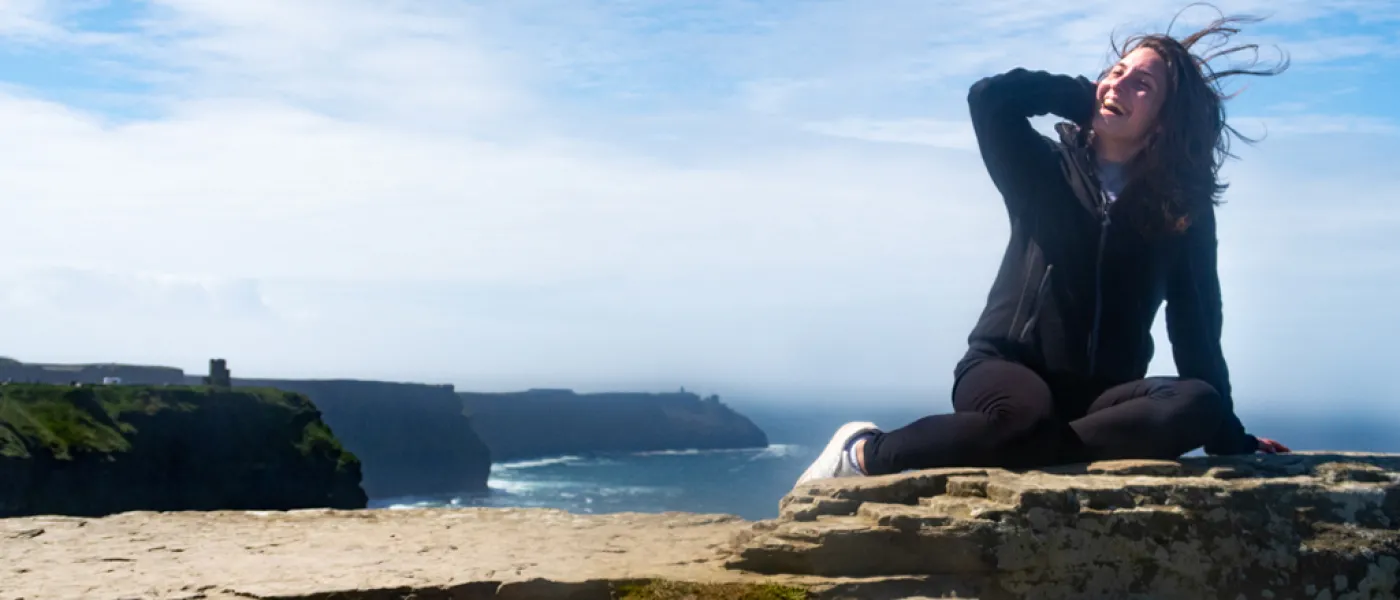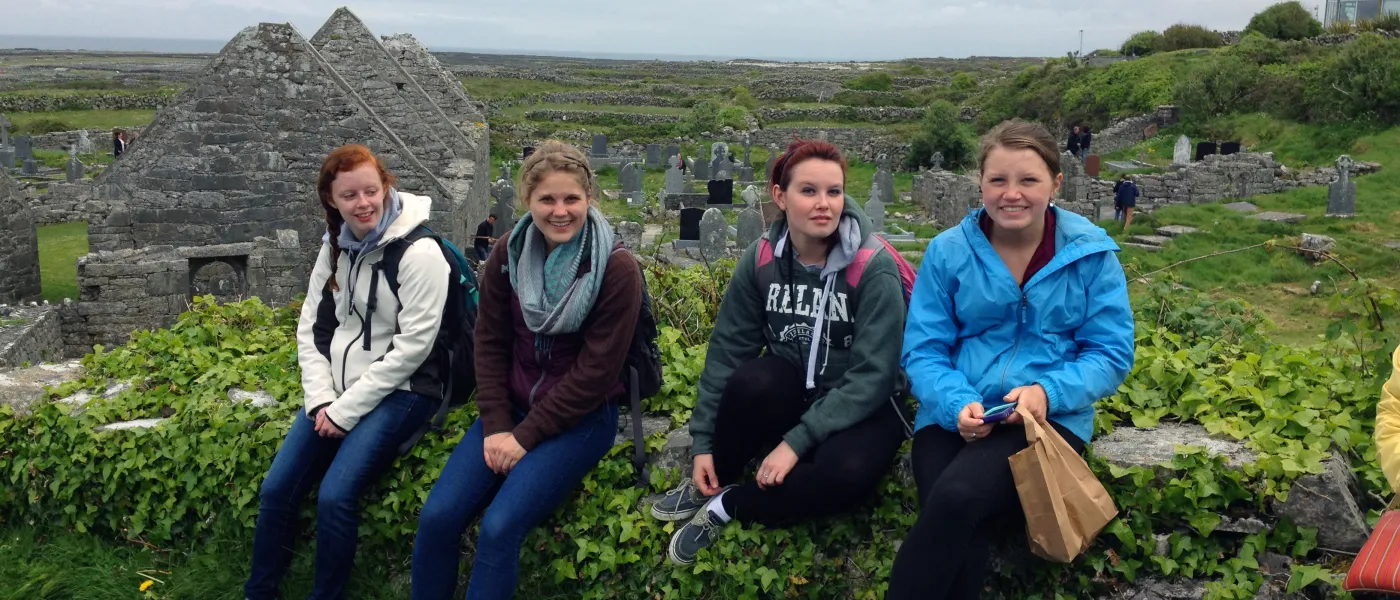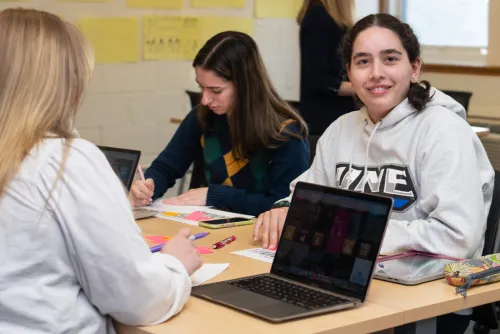
What Will You Study? Elementary Education Degree Curriculum Overview
There are many ways you can navigate this major. You can even complete a concentration in Physical Education (PE) to become a PE teacher.
B.S. in Elementary Education Courses
The following are just some examples of the exciting courses that the Elementary-Middle Education major offers:
- Supporting 21st Century Learning Through Technology
- Diversity Issues in Schools
- Inclusive Methods and Data-Based Decision Making
- Exceptionalities in the Classroom
K-6 Teaching Certification
Successful completion of the degree program meets all requirements of the Maine State K-6 Teacher Certification Program.
Curriculum
| Nor’easter Core Curriculum | Credits |
|---|---|
| Total Credits | 40 |
| Program Required Courses | Credits |
|---|---|
| EDU 105 – Exploring Teaching | 3 |
| EDU 110 – Supporting 21st Century Learning Through Technology | 3 |
| EDU 115 – Field Work Practicum I | 1 |
| EDU 120 – Education for Community and Belonging | 3 |
| EDU 202 – Curriculum, Instruction & Assessment | 3 |
| EDU 206 – Foundations of Language and Literacy Development | 3 |
| EDU 215 – Field Work Practicum 2 | 2 |
| EDU 274 – Methods of Teaching Social Studies | 3 |
| EDU 275 – Methods of Teaching Science | 3 |
| EDU 376 – Methods of Teaching Reading | 3 |
| EDU 377 – Methods of Teaching Writing | 3 |
| EDU 378 – Methods of Teaching Mathematics | 3 |
| EDU 485 – Elementary Practicum | 3 |
| EDU 491 – Elementary Student Teaching Internship and Seminar | 12 |
| PSY 250 – Lifespan Development in Context | 3 – Fulfills Human Experience - Open Core |
| SPE 220 – Introduction to Special Education | 3 |
| SPE 401 – Inclusive Classroom Management Methods | 3 |
| Total Credits | 57 |
| Open Electives or Physical Education Concentration* | 6–23 |
| Open Electives (as needed to reach 120 credits) | Variable |
| Minimum Total Required Credits | 120 |
|---|
Please note: While some courses can fulfill both core and program requirements, the credits earned do not count twice towards the minimum total required credits for the degree.
*Students pursuing the Physical Education Concentration should see the Concentration Tab below for the course list.
This program requires an overall minimum 2.5 GPA in the major.
Field Experience
The faculty in the School of Education is committed to ongoing and frequent observation and involvement in schools. The teacher education programs at UNE have a specific competency-based focus to meet the Maine standards for teacher certification. All students engaged in teacher preparation will spend time in a field setting in each of the semesters for which they are registered for professional education courses. Involvement in the schools will be connected to specific, course-related tasks (e.g., observation, teaching lessons, conducting experiments, administering assessments, etc.). Transportation to and from schools is the responsibility of the student.
Advanced Standing
All students in education certification programs must apply for admission to Advanced Standing when they have completed at least three (3) semesters and completed at least three (3) education courses. To apply for Advanced Standing, students must develop a portfolio demonstrating how they have met proficiency in the following areas: a) teaching skills, knowledge, and disposition aligned with the Maine Common Core Teaching Standards; b) basic academic skills; and c) professional skills. This portfolio is evaluated by a committee of education faculty, and a pass/fail determination is made based on a holistic rubric.
Students not meeting the Advanced Standing criteria do not remain enrolled in a certification program and MUST change their major to a non-certification major. Students can reapply for Advanced Standing upon completion of each additional semester. Students must pass by the semester before scheduled student teaching (i.e., pass Dec. 1 for Spring student teaching; pass May 1 for Fall student teaching).
Student Teaching
Without specific permission from the School of Education Director, courses may not be taken during the internship semester, so all required coursework must be completed the semester prior to the internship. Admission to the internship is not guaranteed and students must have passed Advanced Standing to apply.
The selection of individual internship sites will be made by the Certification and Placement Officer. Geographical location relative to UNE is a consideration. UNE has a collaborative relationship with many districts and selects both schools and teachers based on their interest in and ability to assist interns in demonstrating mastery of the Maine Common Core Teaching Standards. Placement in an internship is not guaranteed. The School of Education reserves the right to deny requests for courtesy internship placement for reasons it deems appropriate or necessary. The University, at its discretion, will not place students in internship settings (1) where an intern's children or relatives are enrolled, or (2) where a spouse or relative of an intern is currently employed. The School of Education, through its Certification and Placement Officer, will make a good-faith effort to negotiate an appropriate placement. Schools have the right to refuse placement requests. The fifteen (15)-week student teaching experience must be done in a local Maine Public School that is in an established internship protocol with the University of New England. Students may not be permitted to accept a contracted teaching position (e.g., long-term substituting, yearlong internship) before completing at least half a semester of student teaching internship. However, student teaching interns may be permitted to sub on a day-to-day basis for their classroom teacher.
Professional Educator Review Board
All students enrolled in the internship must demonstrate their teaching competence with respect to Maine Common Core Teaching Standards before the Professional Educator Review Board (PERB). The Board is comprised of professional educators from area schools as well as UNE faculty. Students are required to develop a presentation reflecting their proficiency in meeting these state standards and present and defend the presentation in front of the Board. Passing PERB is a requirement for completion of the certification program and subsequently being recommended to the Maine State Department of Education for teacher licensure.
To learn more about the program see the Academic Catalog.
Meet Kaylee, Education ’22
With the support of her family and professors at UNE, Kaylee has made it her mission to prove that teaching can be possible for individuals of all abilities.
Career Paths for Elementary Education Majors
Your bachelor’s in Education prepares you to be at the head of the class. Equipped with knowledge, critical thinking skills, and a wide range of student teaching experiences, you will be prepared, confident, and credentialed as you step off the graduation podium and into the rewarding career of teaching.
Our graduates enjoy many benefits, including:
- Employability in a steadily-growing field
- The option to work in public or private schools
- The flexibility of working in any geographical area (coursework reciprocity in 47 states)
- The benefit of our reputation for excellence among local schools
Career Advising for B.S. in Elementary Education Students
Whether you have a specific career goal in mind or a vague idea of the field that interests you, Career Advising is here to help you plan your next step.
Recognition for UNE’s Elementary Education Program
Experiential Learning in the Bachelor’s Degree in Elementary Education Program
Imagine yourself assisting with early literacy screenings, serving as an educational technician, or creating a Family Education Night. Beginning in your first semester, you’ll be out of the pupil’s chair and in the teacher’s seat.
Field Work in the Schools
- Support a classroom teacher
- Participate in Response to Intervention (RTI)
- Assist in educational evaluations
- Help to run an after school program
- Engage family and community in educational activities
Internship for Elementary Education Majors
Your hands-on learning culminates with a 15-week student teaching internship.
- Refine skills acquired through coursework and fieldwork
- Become comfortable and confident in your teaching abilities
- Form close working relationships with students and school personnel
- Network and make connections that will increase your employability
UNE Student Teaching Day in the Life
Global Education in the Bachelor’s Degree in Elementary Education
Ireland
EDU 242: Comparative Education in a Global Context
Dr. Lane Clarke
This course investigates comparative education theories and philosophy to examine education in different contexts and includes spending eight days in Ireland in mid-May following final exams. You extend your knowledge of society and how this is enacted through the institution of its schools. In Ireland, you visit schools and learn about Irish culture and history by touring castles, the famous Cliffs of Moher, and the Aran Islands. Other highlights may include exploring the Ring of Kerry and spending time in Galway, Cork, Kinsale, and Killarney.





To enroll in these courses and learn more, visit the Global Education Program website.
Apply Today
Ready to begin your future in UNE’s B.S. in Elementary Education degree program? Get started today.

Bachelor of Science in Elementary Education FAQ
What is an elementary education degree?
If your goal is to become an elementary school teacher, choosing a bachelor’s degree in elementary education is ideal. This program prepares students with the skills and knowledge to teach in a K-6 classroom and receive Maine state certification in this area.
An elementary education degree from UNE prepares you to transition from student to teacher. Through creative field experiences, you’ll gain diverse skills, boosting your confidence for your career. Our flexible curriculum allows you to broaden your horizons with double majors, minors, or concentrations, study abroad, or meaningful internships designed to enhance your job prospects. Upon graduation, you’ll hold a Maine teacher certification and practical experience to impact your students’ lives.
Certification is only offered at the undergraduate level as bachelor’s degrees target those new to the field. At the graduate level degrees are available for licensed teachers seeking specialization and individuals transitioning to teaching from another subject.
Learn more about UNE’s Bachelor of Science (B.S.) degree program in Elementary Education
What can I do with an elementary education degree?
An elementary education degree enables graduates to be highly effective teachers in elementary classrooms. While teaching in a traditional school setting is the most obvious career path, there are a few different career paths that elementary education majors can pursue. Classroom teachers can progress to school leadership positions like deans, assistant principals, principals overseeing entire schools, or administrative roles contributing to district-level leadership. Many of these positions will often require an advanced degree.
Elementary education majors are well-prepared for diverse careers beyond the classroom, such as roles in admissions counseling, after-school program direction, curriculum development, educational consulting, museum educator, and corporate training. This is built on skills you’ll develop, including decision-making, face-to-face communication, listening, public speaking, reasoning, social awareness, teamwork, and written communication.
UNE graduates with an elementary education degree enjoy numerous advantages. These include high demand for jobs in the field, the choice to teach in New England public or private schools, geographical flexibility (reciprocity in 47 states), and the benefit of our reputation for excellence among local schools.
Students also have the ability to work with our Academic and Career Advising Center. It doesn’t matter if you have a clear career goal or just a general interest in a field.
Is an elementary education degree a B.A. or B.S.?
In general, the main difference between a B.A. and a B.S. is the subject matter. A B.A. emphasizes critical thinking, communication, and holistic learning, while a B.S. emphasizes logic, reasoning, and quantitative skills. Overall, they are not that different. Your choice of major will usually determine whether you earn a B.A. or B.S.
The Elementary Education degree at the University of New England is offered as a Bachelor of Science (B.S.) degree. Additionally, there are master’s degrees and graduate certificates at the graduate level.
Teaching at the secondary level requires subject-specific expertise. UNE has a flexible curriculum that allows you to double major, minor, or concentrate on your area of interest while earning your B.S. in Education. We also offer minors in Special Education and Coaching.
What grades can you teach with an elementary education degree?
Educators with an elementary education degree can typically teach kindergarten through grade six.
If you earn a bachelor’s degree in elementary education from UNE, you are certified to teach grades K-6 in Maine. You can even complete a concentration in Physical Education (PE) to be eligible for certification to become a PE teacher.
What courses are required for elementary education?
To earn your degree in elementary education, you’ll complete required education courses and core classes, covering subjects such as English, applied mathematics, social studies, history, foreign languages, and science. A teacher preparation program provides students with insights into educational best practices, crafting age-appropriate curricula, and understanding child psychology. These courses equip them to teach children with diverse abilities, backgrounds, and needs. Keep in mind that some states require teachers to attain a master’s degree after achieving their teaching certification, so it’s crucial to review your intended teaching state’s requirements.
At UNE, students must meet the following requirements for a degree in elementary education with a certification:
- Complete College of Arts and Sciences (CAS) Core Requirements
- Complete Professional Courses
- Complete field experience
- Complete a 15-week student teaching experience at a local Maine Public School
- Complete Advanced Standing requirements at 60 credits
- Demonstrate their teaching competence with respect to Maine Common Core
- Teaching Standards before the Professional Educator Review Board (PERB)
At the completion of their bachelor’s degree, UNE elementary education students will be able to:
- Demonstrate mastery of the Maine Common Core Teaching Standards
- Demonstrate professionalism through accountability and engagement
- Demonstrate ability to communicate effectively in both written and oral formats
- Demonstrate appropriate dispositions as defined by professional expectations
Examples of elementary education classes you’ll take at UNE include:
- Supporting 21st Century Learning Through Technology
- Diversity Issues in Schools
- Inclusive Methods and Data-Based Decision Making
- Exceptionalities in the Classroom
What are the best colleges for elementary education for me?
There are many factors to consider when choosing the best elementary education program for you.
Faculty
Identify your priorities as a future teacher and learn more about your potential instructors. Discover what kind of connections you can make there that will further your elementary education career.
The faculty in UNE’s Education programs in Maine are committed to ongoing and frequent observation and involvement in schools.
Learn more about UNE School of Education faculty and professional staff
Curriculum
Learn about the types of classes you’ll be taking, the amount of field experience, and internships and student teaching opportunities. Ask about things that matter to you including class size and learning environment.
UNE has a flexible curriculum that allows for double majors, minors, concentrations, and study abroad – all of which help make you a well-rounded person and a highly desirable teacher. There are many ways you can navigate the elementary education major. You can even complete a concentration in Physical Education (PE) to become eligible for certification as a PE teacher.
UNE is actively engaged in experiential learning. Program highlights include hands-on learning experiences. Students benefit from continuous fieldwork beginning in their first semester and continuing in every education course and culminating in a 15-week student teaching internship.
Career goals
Determine if the program offers career advising and qualifies you for the elementary education career you want including the right accreditation and licensing or certification requirements you’ll need to meet for professional practice.
UNE has strong relationships with local schools which means our School of Education students benefit from continuous fieldwork, beginning their first semester. The hours spent working directly with K-6 students prepare graduates to be the best elementary education teachers they can be and often open the door to opportunities for permanent employment.
Examples of fieldwork in schools include:
- Supporting a classroom teacher
- Participating in Response to Intervention (RTI)
- Assisting in educational evaluations
- Helping to run an after-school program
- Engaging family and community in educational activities
There is a tremendous need for general elementary education teachers in Maine. The Maine Department of Education reports a shortage for the 2023-2024 school year. UNE students complete a four-year curriculum leading to a Bachelor of Science degree in Elementary Education and earn Maine certification. UNE has reciprocity with the majority of states in the United States including the New England region.
Overall, UNE offers Career Advising to help Elementary Education graduates plan their next step. 95% of UNE undergraduates are employed or engaged in ongoing higher education within one year of graduating.
Location and environment
Ask yourself what kind of environment suits you best. Figure out if you want to stay in your state or if you wish to move. See if you will be inspired or challenged by your fellow students.
Undergraduate students from the UNE School of Education pursue their studies on UNE’s picturesque Biddeford Campus. Our Biddeford campus in Maine offers 4,000 feet of shoreline in a renowned vacation spot. Meanwhile, our Tangier, Morocco Campus provides modern facilities in a prime global studies location.
Read testimonials from UNE School of Education students
There are also study-abroad options available for UNE students. In addition to opportunities to spend a semester abroad, you may choose to enroll in our education-related or another short-term travel course.
Learn more about study abroad opportunities at UNE
Financial aid
Does the school you are considering offer financial aid or scholarships to help you in your education?
UNE offers merit-based scholarships independent of whatever degree path you choose. Our tuition is 16% below the average tuition for private universities in New England. We are committed to affordability in education. Here are some relevant statistics:
- 98% of undergraduates receive merit-based scholarships
- The average total award package for our students is $24K
- $42M awarded annually in institutional scholarships
Learn more about grants and scholarships available for students at UNE
